01 衡水中学高一英语预习知识点——unit1
高一英语必修一unit1知识点
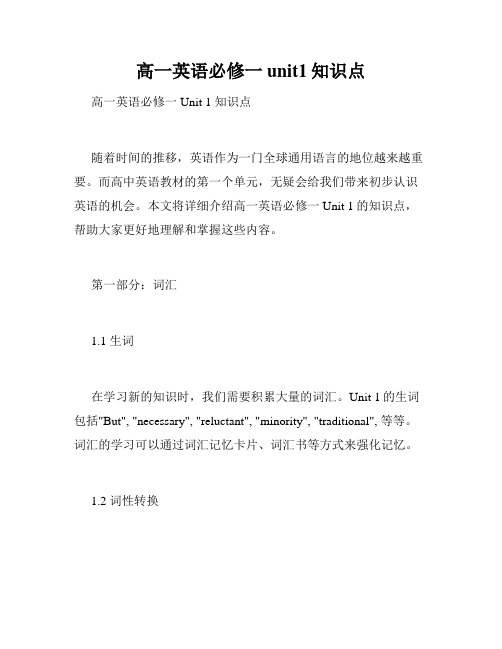
高一英语必修一unit1知识点高一英语必修一Unit 1 知识点随着时间的推移,英语作为一门全球通用语言的地位越来越重要。
而高中英语教材的第一个单元,无疑会给我们带来初步认识英语的机会。
本文将详细介绍高一英语必修一Unit 1的知识点,帮助大家更好地理解和掌握这些内容。
第一部分:词汇1.1 生词在学习新的知识时,我们需要积累大量的词汇。
Unit 1的生词包括"But", "necessary", "reluctant", "minority", "traditional", 等等。
词汇的学习可以通过词汇记忆卡片、词汇书等方式来强化记忆。
1.2 词性转换我们还需要学习词性转换,以用不同的词性来表达不同的含义。
比如,"reluctantly"是"reluctant"的副词形式,"necessity"是"necessary"的名词形式。
第二部分:语法2.1 形容词和副词的比较级和最高级在Unit 1中,我们学习了形容词和副词的比较级和最高级的用法。
比如,在比较两个人或物的不同时,我们可以使用比较级,如"Mary is taller than Tom." 在比较三个或多个人或物时,我们可以使用最高级,如"This is the most interesting book I've ever read."2.2 一般现在时和一般过去时在Unit 1中,我们也学习了一般现在时和一般过去时的用法。
一般现在时用来表达我们常常发生的动作或习惯,如"I usually goto school by bus." 一般过去时则用来表达过去的动作或状态,如"He studied hard last night."第三部分:阅读理解3.1 阅读技巧在英语学习中,我们需要培养良好的阅读理解能力。
高一必修一英语知识点u1

高一必修一英语知识点u1Unit 1: FriendshipIntroduction:In this unit, we will delve into various aspects of friendship and learn important English language skills related to this theme. We will explore vocabulary, grammar, reading, writing, and listening activities to enhance our understanding and communication abilities in English. Let's embark on this enriching journey together!1. Vocabulary:Vocabulary plays a crucial role in effective communication. In this unit, we will encounter words and phrases related to friendship. It is essential to grasp the meaning, pronunciation, and usage of these terms. Practice using new vocabulary in different contexts to expand your linguistic repertoire.2. Grammar:In Unit 1, we will focus on verb tenses, particularly the simple present and present continuous. Understanding the appropriate times to use each tense will enable us to express ideas about friendship accurately. Practice constructing sentences and asking questions using these tenses to strengthen your grammatical skills.3. Reading:Through various reading materials, such as articles, stories, and poems, we will explore different perspectives on friendship. Reading comprehension exercises will enhance our understanding of the texts and help developcritical thinking skills. Pay attention to details, make inferences, and summarize key points to improve your reading abilities.4. Writing:Effective writing skills are fundamental for expressing thoughts and ideas about friendship. In this unit, we will work on descriptive writing, focusing on describing a friend or an important friendship experience. Proper sentence structure, coherent paragraphs, and vivid language will make your writing engaging and compelling.5. Listening:Listening comprehension is crucial in any language learning process. In Unit 1, we will listen to dialogues, interviews, and lectures related to friendship. Listening exercises will enhance our ability to understand spoken English, identify main ideas, and extract specific information. Pay attention to different accents, intonation, and contextual clues to improve your listening skills.6. Speaking:Developing oral communication skills is essential for effective interaction with friends and peers. Engage in speaking activities that promote discussions about friendship, sharing personal experiences, and expressing opinions. Focus on fluency, pronunciation, and using appropriate vocabulary and grammar to build confidence in spoken English.Conclusion:Unit 1 provides a comprehensive study of friendship-related topics and equips us with the necessary language skills to navigate English communication successfully. Through vocabulary, grammar, reading, writing, listening, and speaking activities, we will enhance our overall English proficiency. Embrace the learning process, actively participate in class, and enjoy the journey towards fluency and understanding in English. Let's foster meaningful connections through the power of language and friendship!。
高一英语必修一unit1知识点梳理
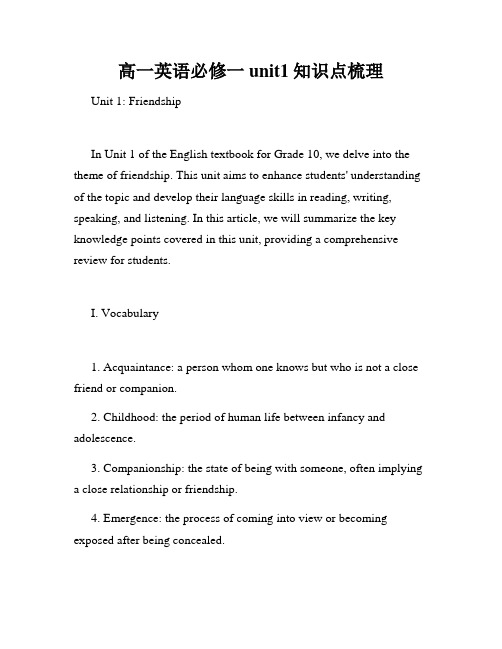
高一英语必修一unit1知识点梳理Unit 1: FriendshipIn Unit 1 of the English textbook for Grade 10, we delve into the theme of friendship. This unit aims to enhance students' understanding of the topic and develop their language skills in reading, writing, speaking, and listening. In this article, we will summarize the key knowledge points covered in this unit, providing a comprehensive review for students.I. Vocabulary1. Acquaintance: a person whom one knows but who is not a close friend or companion.2. Childhood: the period of human life between infancy and adolescence.3. Companionship: the state of being with someone, often implyinga close relationship or friendship.4. Emergence: the process of coming into view or becoming exposed after being concealed.5. Genuine: sincere and honest, without any pretense or ulterior motive.6. Intimate: close, personal, and private, often referring to a deep or romantic relationship.7. Loyalty: the quality of being faithful and committed to someone or something.8. Mutual: felt or experienced by both parties involved.9. Peer: a person who belongs to the same age group or has the same social status as others.10. Virtue: a morally good or admirable quality.II. Reading Comprehension1. Main ideas: Identify the main ideas or themes conveyed in a passage, paragraph, or sentence.2. Inference: Make logical deductions or conclusions based on the given information.3. Contextual clues: Use the surrounding words or sentences to understand the meaning of unknown words or phrases.4. Details: Pay attention to specific details given in the text to enhance comprehension and answer comprehension questions.5. Text structure: Analyze how a text is organized, such as through cause and effect, problem and solution, or sequence.III. Grammar1. Present simple tense: Use the present simple tense to express general truths, habitual actions, and permanent situations.2. Present continuous tense: Use the present continuous tense to express actions happening at the present moment or temporary situations.3. Comparative and superlative forms: Use comparative and superlative forms to compare adjectives, adverbs, and nouns.4. Passive voice: Use the passive voice to emphasize the object of an action, rather than the subject.5. Conditional sentences: Use conditional sentences to express hypothetical situations or cause and effect relationships.6. Reported speech: Use reported speech to convey what someone said or thought, with necessary changes in pronouns, tenses, and adverbs.IV. Writing Skills1. Informal letter writing: Follow the appropriate format for informal letter writing, including a salutation, body paragraphs, and a closing.2. Narrative writing: Tell a story or recount an event using appropriate narrative techniques, such as sequencing, descriptive language, and dialogue.3. Argumentative writing: Present arguments and counterarguments to support or refute a given statement or opinion.V. Speaking and Listening Skills1. Participate in group discussions: Engage in conversations, expressing opinions, asking clarifying questions, and responding appropriately to others.2. Presentations: Deliver a speech or presentation on a given topic, structuring ideas coherently and using appropriate visual aids.3. Active listening: Pay full attention, ask questions for clarification, and respond appropriately during listening exercises or presentations.In conclusion, Unit 1 of the Grade 10 English textbook focuses on the theme of friendship. By understanding the key vocabulary,improving reading comprehension, mastering grammar structures, honing writing skills, and enhancing speaking and listening abilities, students will develop a comprehensive foundation in English language learning.。
英语高一第一课知识点总结

英语高一第一课知识点总结英语高一第一课是学习英语的基础知识,这篇文章将对该课程的重要知识点进行总结。
文章按照逻辑顺序将涵盖课程内容,并提供相关的例子和解释。
以下是对英语高一第一课知识点的全面总结。
1. 英语字母表及发音英语字母表是学习英语的基础,我们需要熟悉26个英文字母的大小写并了解它们的发音。
例如,字母"A"的发音是/ə/,而字母"B"的发音是/biː/。
通过正确掌握字母的发音,我们可以更好地理解和学习英语单词和句子。
2. 问候与自我介绍在日常交流中,正确的问候和自我介绍是必不可少的。
比如,我们可以用“Hello”来问候他人,而用“My name is…”来进行自我介绍。
这些简单的表达方式可以帮助我们与他人建立联系,展示我们的礼貌和口语表达能力。
3. 人称代词人称代词是用来代替人或事物的词语。
在英语中,常用的人称代词包括“I”,“you”,“he”,“she”,“it”,“we”和“they”。
通过正确使用人称代词,我们可以避免重复使用名词,并使句子更加简洁明了。
4. 系动词和形容词系动词被用来连接主语和补语,它们描述主语的状态或性质。
常见的系动词包括“be”,“become”和“seem”。
形容词则用来修饰名词或代词,帮助我们详细描述人或物的特征。
例如,在句子“John is tall”中,“is”是系动词,而“tall”是形容词。
5. 一般现在时一般现在时用于表达经常性的动作、习惯或真理。
例如,“I go to school every day”中的“go”表示的是我经常性的动作。
我们需要掌握动词的变位规则,以便正确应用一般现在时。
6. 祈使句祈使句用于表达命令、要求或建议。
它们通常以动词开头,不使用主语。
比如,“Open the door”表示命令他人打开门,“Pleasebe quiet”表示要求他人保持安静。
我们需要注意使用祈使句时的动词形式和语气。
高中英语必修一unit1知识点归纳
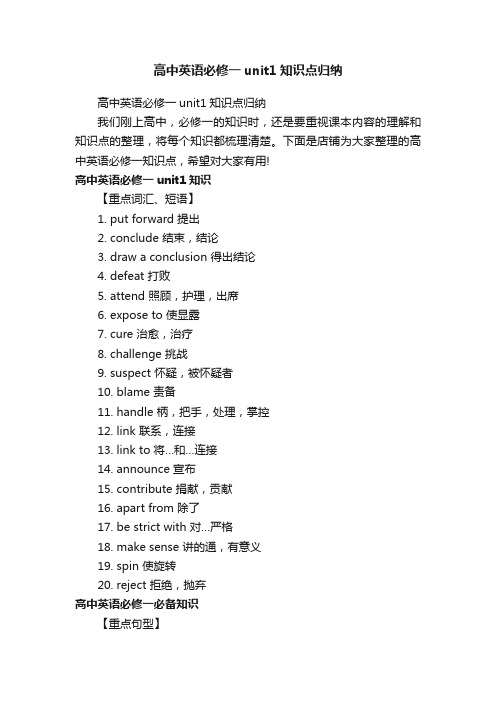
高中英语必修一unit1知识点归纳高中英语必修一unit1知识点归纳我们刚上高中,必修一的知识时,还是要重视课本内容的理解和知识点的整理,将每个知识都梳理清楚。
下面是店铺为大家整理的高中英语必修一知识点,希望对大家有用!高中英语必修一unit1知识【重点词汇、短语】1. put forward 提出2. conclude 结束,结论3. draw a conclusion 得出结论4. defeat 打败5. attend 照顾,护理,出席6. expose to 使显露7. cure 治愈,治疗8. challenge 挑战9. suspect 怀疑,被怀疑者10. blame 责备11. handle 柄,把手,处理,掌控12. link 联系,连接13. link to 将…和…连接14. announce 宣布15. contribute 捐献,贡献16. apart from 除了17. be strict with 对…严格18. make sense 讲的通,有意义19. spin 使旋转20. reject 拒绝,抛弃高中英语必修一必备知识【重点句型】1. What do you know about infectious diseases?你对传染性疾病了解多少?2. John Snow was a famous doctor in London – so expert, indeed, that he attended Queen Victoria as her personal physician.约翰•斯诺是伦敦一位著名的医生——他的确医术精湛,因而成为维多利亚女王的私人大夫。
3. But he became inspired when he thought about helping ordinary people exposed to cholera.但当他一想到要帮助患了霍乱的'普通老百姓,他就感到很振奋。
高一第1课英语知识点汇总

高一第1课英语知识点汇总英语知识点是学习英语的基础,掌握这些知识点对于高一学生来说至关重要。
以下是高一第1课英语知识点的汇总,希望对同学们的学习有所帮助。
一、时态及语态1. 一般现在时:表示经常性或习惯性的动作、客观事实或真理。
例句:I go to school every day.2. 现在进行时:表示正在进行的动作。
例句:She is studying English now.3. 一般过去时:表示过去某个时间发生的动作或状态。
例句:I went to the park yesterday.4. 过去进行时:表示过去某个时间正在进行的动作。
例句:They were playing basketball last night.5. 一般将来时:表示将来某个时间要发生的动作。
例句:We will have a party next week.6. 被动语态:将动作的承受者放在句子的主位,强调动作的接受者而非执行者。
例句:The book was written by Mark Twain.二、词汇及短语1. 常见的问候用语:hello、hi、how are you、good morning、good afternoon、good evening等。
例句:Hello, how are you?2. 人称代词:I、you、he、she、it、we、they等。
例句:She is my friend.3. 数字:one、two、three、four、five等。
例句:I have two dogs.4. 学科名称:math、history、geography、biology等。
例句:I don't like biology.5. 动词短语:go to school、get up、have breakfast、play basketball 等。
例句:I usually get up at 7 o'clock.三、句型结构1. 陈述句:主语+谓语+宾语。
高一英语必修一u1知识点总结
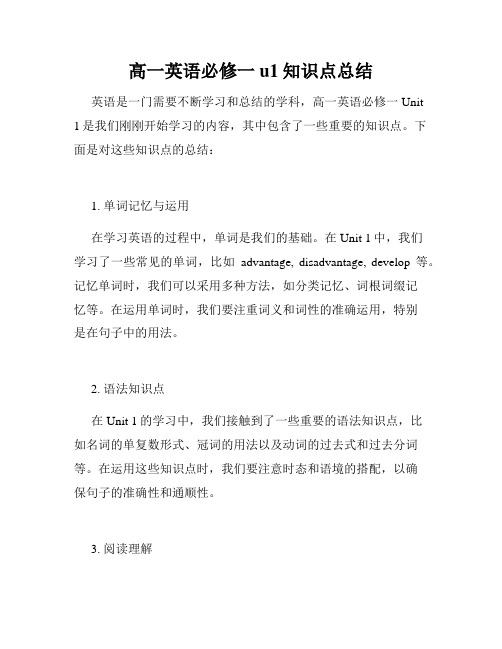
高一英语必修一u1知识点总结英语是一门需要不断学习和总结的学科,高一英语必修一Unit1是我们刚刚开始学习的内容,其中包含了一些重要的知识点。
下面是对这些知识点的总结:1. 单词记忆与运用在学习英语的过程中,单词是我们的基础。
在Unit 1中,我们学习了一些常见的单词,比如advantage, disadvantage, develop等。
记忆单词时,我们可以采用多种方法,如分类记忆、词根词缀记忆等。
在运用单词时,我们要注重词义和词性的准确运用,特别是在句子中的用法。
2. 语法知识点在Unit 1的学习中,我们接触到了一些重要的语法知识点,比如名词的单复数形式、冠词的用法以及动词的过去式和过去分词等。
在运用这些知识点时,我们要注意时态和语境的搭配,以确保句子的准确性和通顺性。
3. 阅读理解在Unit 1的阅读部分,我们学习了一篇关于“广告”的文章。
通过阅读这篇文章,我们了解到了广告的作用和影响。
在阅读理解时,我们要注意提取关键信息,理解作者的观点和意图,并能够运用所学知识进行分析和总结。
同时,我们也要培养良好的阅读习惯,如注重文章的结构和逻辑关系,提高阅读效率和准确度。
4. 写作技巧在Unit 1的写作部分,我们学习了一些写作技巧,如写作目的、写作步骤和写作要点等。
在写作时,我们要明确写作目的,合理安排写作步骤,并运用所学知识点进行表达。
同时,要注意语言的准确性和连贯性,使文章内容更加清晰和易读。
5. 口语表达英语学习的最终目标是能够流利地进行口语交流。
在Unit 1中,我们学习了一些与社交活动相关的口语表达,如问候、介绍和邀请等。
在口语表达时,我们要练习正确的发音、流利的语速和自然的语调,培养自信心和积极的沟通能力。
总之,高一英语必修一Unit 1是我们英语学习的开端,其中包含了一些基础的知识点和技巧。
通过对这些知识点的学习和总结,我们可以打下良好的英语基础,为接下来的学习奠定稳固的基础。
在学习过程中,我们要时刻保持积极的学习态度,注重实践和运用,相信我们一定能够取得不错的成绩。
高一英语知识点第一单元
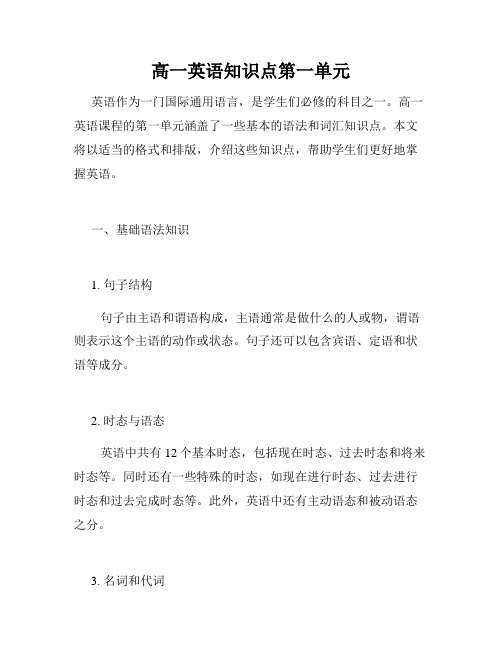
高一英语知识点第一单元英语作为一门国际通用语言,是学生们必修的科目之一。
高一英语课程的第一单元涵盖了一些基本的语法和词汇知识点。
本文将以适当的格式和排版,介绍这些知识点,帮助学生们更好地掌握英语。
一、基础语法知识1. 句子结构句子由主语和谓语构成,主语通常是做什么的人或物,谓语则表示这个主语的动作或状态。
句子还可以包含宾语、定语和状语等成分。
2. 时态与语态英语中共有12个基本时态,包括现在时态、过去时态和将来时态等。
同时还有一些特殊的时态,如现在进行时态、过去进行时态和过去完成时态等。
此外,英语中还有主动语态和被动语态之分。
3. 名词和代词名词是表示人、事物、地方、抽象概念等的词语。
代词则用来代替名词,避免重复使用。
4. 动词和形容词动词用来表示动作或状态,而形容词用来描述名词的性质和特点。
二、常用词汇1. 人物在学习英语过程中,我们需要掌握一些表示人物的词汇,如family(家庭)、teacher(老师)、student(学生)等。
2. 动词动词是英语句子中的关键部分,需要掌握一些常用的动词,如go(去)、study(学习)、read(阅读)等。
3. 形容词形容词可以用来描述名词的性质,如happy(快乐的)、strong(强壮的)、beautiful(美丽的)等。
三、语法规则1. 形容词的比较级和最高级形容词的比较级用于比较两个人或物的不同程度,通常在形容词后加上-er来表示。
最高级则用于表示三个或三个以上人或物的比较,通常在形容词前加上the最高级。
2. 简单句和复合句简单句由一个主语和一个谓语构成,而复合句则有一个主句和一个或多个从句构成。
四、学习方法与技巧1. 制定学习计划高一英语学习内容较为复杂,学生们可以制定学习计划,合理安排时间,分配好学习任务。
2. 多做练习练习是提高英语水平的关键,通过做大量的练习题,可以巩固所学知识,并提高语言运用能力。
3. 多听多读多说多写提高英语听说能力需要多进行听力和口语练习。
新高一英语必修一U1知识点

新高一英语必修一U1知识点Unit 1: Friendship - Key PointsIntroduction:As students enter their 11th grade, they will embark on a new journey of learning in English language and literature. In this unit, we will explore the theme of friendship, which plays a significant role in our lives. By focusing on the key points of this unit, students will deepen their understanding of friendship, develop their English language skills, and enhance their analytical and critical thinking abilities.1. The Importance of Friendship:Friendship is an essential aspect of human existence. It brings joy, support, and companionship, enabling individuals to share experiences, seek advice, and find emotional solace. Friends serve as pillars in times of need and add meaning to our lives. Through literature and various texts in this unit, students will examine the significance of friendship in different cultural, historical, and personal contexts.2. Vocabulary and Grammar:Acquiring a strong vocabulary and understanding grammar rules are essential for effective communication. Throughout this unit, students will encounter a variety of vocabulary related to friendship and relationships. They will learn how to properly use adjectives to describe qualities of friendship and comparative and superlative forms to express their preferences. Additionally, students will practice the use of present simple, present continuous, and past simple tenses to describe events, actions, and experiences related to friendship.3. Reading Comprehension:Developing strong reading skills is crucial for comprehending texts and extracting relevant information. In this unit, students will read a range of texts, including poems, short stories, and articles, all centered around the theme of friendship. They will learn effective reading strategies, such as scanning for specific details, skimming for main ideas, and making inferences to enhance their comprehension abilities.4. Writing Skills:Written communication is a fundamental skill for expressing ideas and emotions. In this unit, students will practice different types of writing related to friendship, including personal narratives, persuasive essays, and descriptive pieces. They will focus on organizing theirideas coherently, using appropriate vocabulary and grammar, and developing a clear and engaging writing style.5. Speaking and Listening:Oral communication is vital for expressing thoughts, engaging in discussions, and actively participating in social interactions. Through various activities, such as group discussions, role-plays, and presentations, students will enhance their speaking and listening skills. They will learn to express their opinions, actively listen to others, and engage in respectful and meaningful conversations related to friendship.Conclusion:By focusing on the key points discussed in this unit, students will gain a deeper understanding of friendship, improve their vocabulary and grammar skills, enhance their reading comprehension abilities, develop their writing skills, and strengthen their oral communication capabilities. The exploration of friendship in different contexts will encourage students to reflect on their own experiences and cultivate meaningful relationships with others.。
2021届河北衡水中学高考英语一轮复习第1部分 必修1 Unit 1 Lifestyles

5
答案 栏目导航
13._so_l_v_e_ vt.解决;解答 14._su_r_v_e_y_ n.调查 15._su_p_p_o_s_e_ vt.认为,猜想 16._d_o_cu_m__e_n_t n.公文,文件 17._su_p_p_o_r_t_ vt.&n.支持;支撑
6Leabharlann 答案 栏目导航7[语境运用] 用所给词的适当形式填空
environmental groups.
8.We should develop the students' ability __to__so_l_v_e_ (solve)problems.
答案 栏目导航
9
拓展单词
1.peace n.和平→_p_e_a_c_e_fu_l_ adj.平静的;和平的→__p_ea_c_e_f_u_ll_y_ adv.
志愿的
12.graduate vi.毕业→_g_r_a_d_u_a_t_io_n_ n.毕业 13.challenge n.挑战 vt.向……挑战→_c_h_a_l_le_n_g_i_n_g_ adj.有挑战性的
答案 栏目导航
12
14.advertise v.做广告→_a_d_v_e_r_ti_s_e_r_ n. 登广告的人;广告商 →_a_d_v_e_r_ti_s_em__e_n_t_ n.广告 15.formal adj.正式的,合礼仪的→_in_f_o_r_m_a_l_ adj.非正式的 16.distant adj.遥远的→_d_i_st_a_n_c_e_ n.距离
with these figures.
6.The police have been trying to keep the d_o_c_u_m__e_n_ts_ (document)
高一英语必修一unit1知识点

高一英语必修一unit1知识点高中英语必修一Unit 1 知识点梳理一、词汇与短语1. 形容词与副词- 形容词用于描述名词的特征或属性,如:beautiful, interesting, difficult。
- 副词用来修饰动词、形容词或其他副词,表达方式、程度、时间等,如:quickly, usually, very。
2. 常用短语- as soon as possible:尽快地- as…as:和…一样- take place:发生- in order to:为了- be full of:充满- be strict with:对…严格- look forward to:期待二、语法点1. 比较级和最高级- 形容词和副词的比较级和最高级的构成规则,以及它们的基本用法。
- 比较级用于比较两者,最高级用于比较三者以上。
2. 现在完成时- 现在完成时的构成:助动词have/has + 过去分词。
- 现在完成时表示过去发生的动作对现在造成的影响或结果,或者从过去开始一直持续到现在的动作。
3. 一般现在时- 一般现在时的构成:主语 + 动词原形/第三人称单数形式。
- 一般现在时用于描述经常发生的动作、习惯、事实或状态。
三、阅读理解技巧1. 快速浏览(Skimming)- 快速浏览文章,抓住文章的主旨大意。
- 通过标题、图片、段落首句和尾句等信息进行判断。
2. 寻找主题句- 主题句通常位于段落的开头,概括了该段落的主要内容。
- 通过主题句可以更好地理解段落的核心思想。
3. 推理判断- 根据上下文线索,推断生词或难句的意思。
- 通过逻辑关系和文章结构进行推理。
四、写作技巧1. 开头引入- 使用引人入胜的开头,如引用名言、提出问题或描述一个场景。
- 开头应简洁明了,直接引入文章主题。
2. 正文论述- 按照逻辑顺序组织文章,每个段落只讨论一个中心点。
- 使用恰当的连接词,使文章结构清晰,逻辑性强。
3. 结尾总结- 总结文章的主要观点,重申文章的中心思想。
高一必修一unit1知识点

高一必修一unit1知识点高一必修一 Unit 1 知识点高一必修一英语教材中的第一单元是一个经典的课程单元,它将帮助学生们打好英语学习的基础。
在这个单元中,我们将学习到一些重要的英语知识点,并且通过多样化的教学方式来加深对这些知识的理解。
首先,我们将学习到一些基本的语法知识。
在这个单元中,我们将学习一般现在时的用法。
一般现在时用来表示现阶段的状态或者经常性的行为,它是英语中最基本也是最常用的时态之一。
除此之外,我们还将学习到一些频度副词,比如always、often、sometimes等,它们可以帮助我们描述行为发生的频率。
除了语法知识,我们还将学习到一些重要的词汇和短语。
比如,我们将学习到一些关于家庭、学校和日常生活的词汇。
这些词汇将帮助我们描述我们的家庭成员、学习环境和日常活动。
同时,我们还将学习一些描述人物外貌和性格的词汇。
这些词汇将帮助我们更准确地描绘人物形象。
在这个单元中,我们还将学习一些重要的阅读技巧。
阅读是学习英语的重要一环,通过阅读,我们不仅可以提高我们的词汇量和阅读理解能力,还可以培养我们的思维能力和阐述观点的能力。
在这个单元中,我们将学习如何使用上下文推测词义,在不懂一个单词的情况下,通过上下文来猜测单词的词义。
此外,我们还将学习到一些写作技巧。
写作是英语学习的重要一环,通过写作,我们可以更好地表达自己的观点和思想。
在这个单元中,我们将学习如何写一篇关于自己家庭的文章,如何描述家庭成员以及他们的外貌和性格特点。
同时,我们还将学习如何使用连词和过渡词来链接句子和段落,使文章更加连贯和流畅。
最后,在这个单元中,我们将进行一些有趣的学习活动。
比如,我们可以组织学生们进行小组活动,通过互相交流来提高口语表达能力。
同时,我们还可以举办一场英语演讲比赛,让学生们有机会展示他们的英语表达能力。
通过这些活动,学生们可以在实践中提高自己的英语水平,同时也可以培养他们的合作精神和团队意识。
综上所述,高一必修一第一单元的学习内容涵盖了语法知识、词汇和短语、阅读技巧以及写作技巧。
高一英语必修一预习知识点

高一英语必修一预习知识点高一英语必修一主要学习什么内容?同学们应该掌握哪些重点知识?想要提高英语的学习效率,大家不妨提前预习。
下面是由店铺整理的高一英语必修一预习知识点,希望对您有用。
高一英语必修一Unit1预习知识点1. be good to 对….友好2. add up 合计3. get sth done 使…被做4. calm down 镇定下来5. have got to 不得不6. walk the dog 遛狗7. make a list of 列出8. hide away 躲藏;隐藏9. be concerned about 关心;挂念10. share sth with sb 和某人分享某物11. go through 经历;仔细检查12.set down 放下;记下13. a series of 一系列;一套14. be crazy about 对…着迷15. on purpose 故意16. in order to/ so as to 为了17. face to face 面对面地18. get along with 与…相处19. pack up 收拾,打理行装20. according to 按照;根据…所说21. communicate with sb 和…交际22. try out 试验;试用23. join in 参加(活动)24. fall in love 相爱25. have the/a habit of doing sth 有做…的习惯高一英语必修一Unit2预习知识点1. such as 例如2. believe it or not 信不信由你3. come up with 提出 come up (vi) 走进;上来;发生;被讨论come up to a place 参观某地4. ever before 从前5. even if/ though 即使6. at the end of 在…末期7. be based on 在...基础上8. close to 距离…近9. take…with…随身携带10. the same…as 与…相同的11. at present 目前12. at sb’s request 应某人的要求 make a request 请求request that …(should)+v原形13.have a command of掌握 give commands 命令14.in one direction 朝一个方向15. be different from 与…不同16. as we know 正如我们所知17. play a role/ part (in) 在…中担任角色;在…中起作用;play an important role/ part 在…中起重要作用18. because of 因为;由于19. make (good/ full) use of (好好/充分)利用高一英语必修一Unit3预习知识点1. one-way fare 单程票 round-trip fare 往返票2. graduate from 从…毕业3. care about 忧虑,关心 care for喜欢,照顾care to do愿意/同意做某事4. give in (to) 投降;屈服;让步 give up 放弃give up doing/sth as usual 像往常一样5. at midnight 午夜6. attitude to/ toward(s) 对…态度7. change one’s mind 改变主意8. make camp 野营,宿营9. make up one’s mind to do 决心干某事10. put up one’s tents 搭起帐篷11. persuade sb to do sth= persuade sb into doing sth 说服某人做某事persuade sb not to do sth= persuade sb out of doing sth 说服某人不做某事12. determine to do sth ( 动作) / be determined to do sth (心理) 决心干某事13. take one’s breath away 使某人大吃一惊。
高一英语必修一unit1知识点:重点词汇.doc

高一英语必修一unit1知识点:重点词汇lifestyle·原文再现Talk about your own lifestyle, and find out about other people’s. 谈论你自己的生活方式,并了解别人的生活方式。
·基本用法lifestyle n. 生活方式;生活时尚You should throw over your lifestyle. 你应该改变你的生活方式。
My healthy lifestyles help me get good grades. 我健康的生活方式帮我去得好成绩。
peaceful·基本用法peaceful adj. 和平的,爱好和平的;平静的China is a peaceful country and Chinese people are very friendly. 中国是一个爱好和平的国家,中国人民都很友好。
注:“n+ful”构成形容词peace(n.) 和平;平静----peaceful(adj.)和平的;平静的stress(n.)压力-----stressful (adj.)有压力的The distant country is so peaceful that I don’t want to go back to the noisy city. 遥远的乡村如此宁静以至于我不想返回喧闹的城市。
It was a very stressful time for all of them. 对于他们所有的人来说,那时一段艰难时期。
·知识拓展相关单词peace n. 和平,宁静;平和peacefully adv. 和平地;安静地相关短语in peace 处于和平的状态;平静地He can’t live in peace with his neighbors. 他不能和他的邻居和平共处。
stressful·基本用法stressful adj. 紧张的;有压力的It was a very stressful time for all of them. 对于他们所有的人来说,那时一段艰难时期。
高一英语必修一unit知识点总结
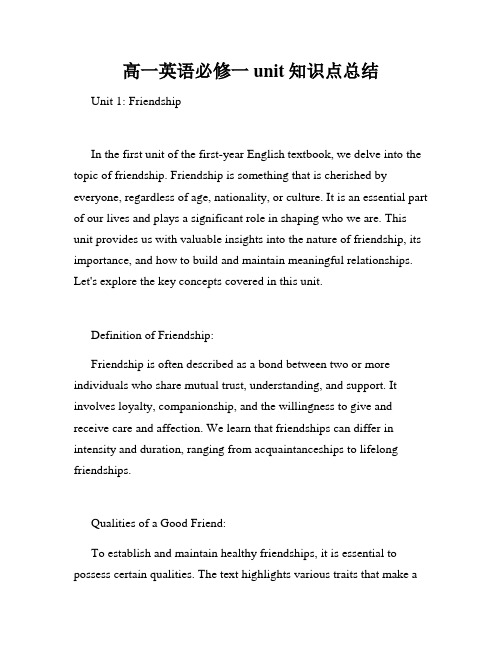
高一英语必修一unit知识点总结Unit 1: FriendshipIn the first unit of the first-year English textbook, we delve into the topic of friendship. Friendship is something that is cherished by everyone, regardless of age, nationality, or culture. It is an essential part of our lives and plays a significant role in shaping who we are. This unit provides us with valuable insights into the nature of friendship, its importance, and how to build and maintain meaningful relationships. Let's explore the key concepts covered in this unit.Definition of Friendship:Friendship is often described as a bond between two or more individuals who share mutual trust, understanding, and support. It involves loyalty, companionship, and the willingness to give and receive care and affection. We learn that friendships can differ in intensity and duration, ranging from acquaintanceships to lifelong friendships.Qualities of a Good Friend:To establish and maintain healthy friendships, it is essential to possess certain qualities. The text highlights various traits that make agood friend, such as trustworthiness, empathy, reliability, and the ability to communicate effectively. These qualities serve as a foundation for building strong and lasting friendships.Building and Maintaining Friendships:Friendships require effort and nurturing to flourish. In this unit, we are introduced to strategies for building and maintaining friendships. Active listening, expressing gratitude, offering support, and resolving conflicts are vital skills discussed in the text. We learn the importance of being open-minded and understanding, as these qualities foster deeper connections with others.Types of Friendships:Friendships come in various forms, each serving a unique purpose in our lives. In this unit, we explore different types of friendships, including childhood friends, school friends, and work friends. Each type of friendship offers distinct experiences, memories, and support systems. Understanding the differences between these friendships can help us appreciate the diversity and dynamics of our social connections.Online Friendships:With the rise of social media and online platforms, friendships have extended beyond physical proximity. This unit sheds light on the phenomenon of online friendships and the potential benefits and drawbacks they bring. It emphasizes the importance of caution and discernment when engaging in online friendships, reminding us to prioritize safety and authenticity.Challenges in Friendships:No relationship is without challenges, and friendships are no exception. Often, misunderstandings, conflicts, and betrayals can strain our friendships. This unit acknowledges these challenges and offers suggestions for resolving conflicts and rebuilding trust. It stresses the significance of open communication, compromise, and forgiveness in resolving differences and strengthening friendships.Cultural Perspectives on Friendship:The concept of friendship varies across cultures. This unit provides insights into how different cultures perceive and approach friendships. Learning about cultural diversity broadens our understanding of the complex nature of friendships and encourages tolerance and acceptance of various perspectives.Conclusion:As we conclude our exploration of the first unit, we recognize the significance of friendship in our lives. Building and maintaining meaningful friendships requires effort, understanding, and empathy. This unit equips us with knowledge and skills to cultivate healthy friendships that can enhance our personal and social well-being. By valuing friendships and appreciating their diversity, we create a more connected and harmonious world.。
高一英语上册unit1的知识点
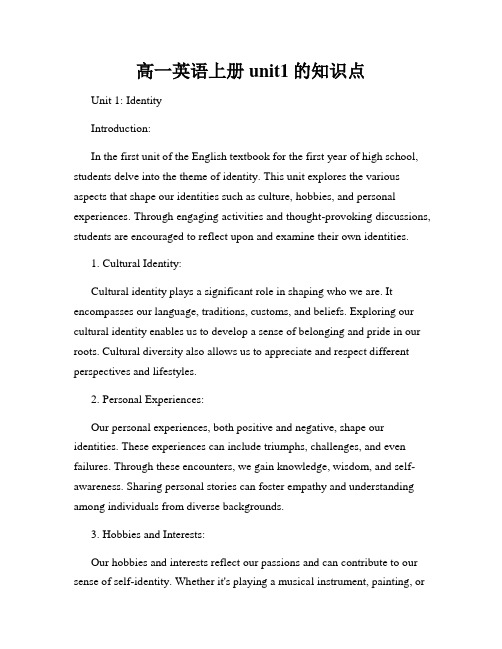
高一英语上册unit1的知识点Unit 1: IdentityIntroduction:In the first unit of the English textbook for the first year of high school, students delve into the theme of identity. This unit explores the various aspects that shape our identities such as culture, hobbies, and personal experiences. Through engaging activities and thought-provoking discussions, students are encouraged to reflect upon and examine their own identities.1. Cultural Identity:Cultural identity plays a significant role in shaping who we are. It encompasses our language, traditions, customs, and beliefs. Exploring our cultural identity enables us to develop a sense of belonging and pride in our roots. Cultural diversity also allows us to appreciate and respect different perspectives and lifestyles.2. Personal Experiences:Our personal experiences, both positive and negative, shape our identities. These experiences can include triumphs, challenges, and even failures. Through these encounters, we gain knowledge, wisdom, and self-awareness. Sharing personal stories can foster empathy and understanding among individuals from diverse backgrounds.3. Hobbies and Interests:Our hobbies and interests reflect our passions and can contribute to our sense of self-identity. Whether it's playing a musical instrument, painting, orplaying sports, these activities bring joy and fulfillment. Engaging in hobbies can provide an escape from daily routines and allow us to explore our creative sides.4. Self-Expression:Self-expression is a powerful tool for individuals to showcase their identity. From spoken word poetry to fashion choices, we use various mediums to express ourselves. Through self-expression, we communicate our thoughts, emotions, and values to others. It enables us to create meaningful connections and spark conversations.5. Gender and Identity:Gender identity is an integral part of who we are. It refers to one's deeply-rooted sense of being male, female, or something else entirely. Gender expression, on the other hand, relates to how we present ourselves visually, behaviorally, and socially. It is important to recognize and respect each individual's gender identity, creating an inclusive and accepting society.6. Global Citizenship:The concept of global citizenship encourages individuals to identify as part of a global community. It emphasizes our shared responsibility to work towards a better world. Understanding the diversity and interconnectedness of our identities enables us to appreciate the value of cultural exchange and collaboration on a global scale.Conclusion:Unit 1 of the high school English textbook deals with the multi-faceted topic of identity. Through exploring cultural identity, personal experiences, hobbies, self-expression, gender, and global citizenship, students gain a deeper understanding of themselves and others. In embracing their own identities, students are better equipped to appreciate and respect the identities of those around them. By fostering empathy and open-mindedness, the foundations for a harmonious and diverse society are built.。
高一英语unit1知识点总结
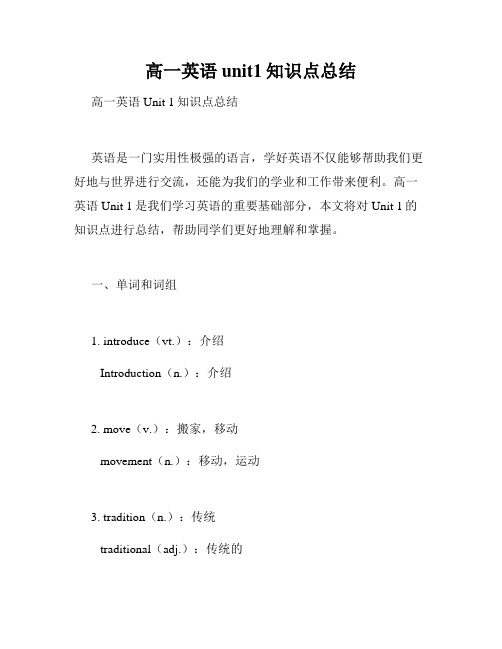
高一英语unit1知识点总结高一英语Unit 1知识点总结英语是一门实用性极强的语言,学好英语不仅能够帮助我们更好地与世界进行交流,还能为我们的学业和工作带来便利。
高一英语Unit 1是我们学习英语的重要基础部分,本文将对Unit 1的知识点进行总结,帮助同学们更好地理解和掌握。
一、单词和词组1. introduce(vt.):介绍Introduction(n.):介绍2. move(v.):搬家,移动movement(n.):移动,运动3. tradition(n.):传统traditional(adj.):传统的4. observe(v.):观察,观察到observation(n.):观察,观测5. challenge(n.):挑战challenging(adj.):具有挑战性的6. improve(v.):改善,提高improvement(n.):改善,提高7. explain(v.):解释explanation(n.):解释8. belief(n.):信念,信仰believe(v.):相信二、语法1. 一般现在时:表示经常性、习惯性的动作或状态,句子结构为主语+谓语动词;如:I often go jogging in the morning.They live in a small town.2. 一般过去时:表示过去某个时间发生的动作或存在的状态,句子结构为主语+谓语动词的过去式;如:She played basketball yesterday.We visited Beijing last summer.3. 现在进行时:表示主语正在进行的动作,句子结构为主语+be+动词-ing形式;如:He is studying in the library.They are playing soccer in the park.4. 一般将来时:表示将要发生或计划中的动作,句子结构为主语+will+动词原形;如:I will travel around the world in the future.She will finish her homework before dinner.三、阅读理解1. 根据上下文推测词义:在阅读理解过程中,经常会遇到一些生词或不熟悉的词汇。
高一英语必修一第一单元知识点
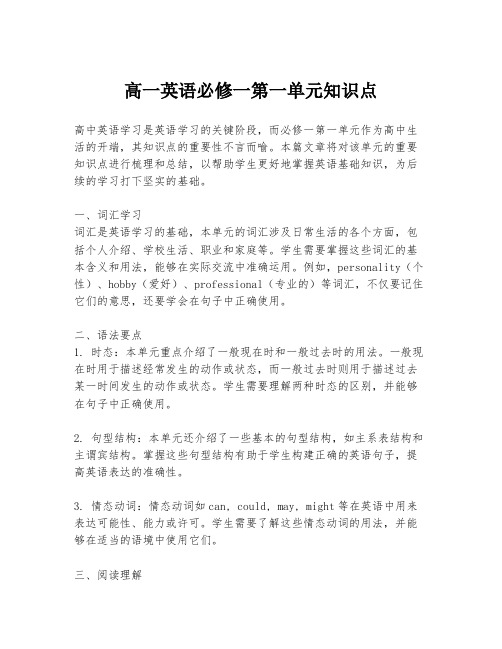
高一英语必修一第一单元知识点高中英语学习是英语学习的关键阶段,而必修一第一单元作为高中生活的开端,其知识点的重要性不言而喻。
本篇文章将对该单元的重要知识点进行梳理和总结,以帮助学生更好地掌握英语基础知识,为后续的学习打下坚实的基础。
一、词汇学习词汇是英语学习的基础,本单元的词汇涉及日常生活的各个方面,包括个人介绍、学校生活、职业和家庭等。
学生需要掌握这些词汇的基本含义和用法,能够在实际交流中准确运用。
例如,personality(个性)、hobby(爱好)、professional(专业的)等词汇,不仅要记住它们的意思,还要学会在句子中正确使用。
二、语法要点1. 时态:本单元重点介绍了一般现在时和一般过去时的用法。
一般现在时用于描述经常发生的动作或状态,而一般过去时则用于描述过去某一时间发生的动作或状态。
学生需要理解两种时态的区别,并能够在句子中正确使用。
2. 句型结构:本单元还介绍了一些基本的句型结构,如主系表结构和主谓宾结构。
掌握这些句型结构有助于学生构建正确的英语句子,提高英语表达的准确性。
3. 情态动词:情态动词如can, could, may, might等在英语中用来表达可能性、能力或许可。
学生需要了解这些情态动词的用法,并能够在适当的语境中使用它们。
三、阅读理解阅读理解是英语学习中的重要技能。
本单元的阅读材料涵盖了多种主题,学生需要通过阅读这些材料来提高自己的阅读速度和理解能力。
同时,学生还应该学会如何从文章中提取关键信息,理解作者的观点和态度,并能够对所读内容进行分析和评价。
四、写作技巧写作是英语学习中的另一个重要方面。
在本单元中,学生将学习如何写一篇简短的自我介绍和描述自己的学校生活。
这要求学生能够组织语言,清晰地表达自己的想法。
写作时,学生应该注意使用恰当的连接词,使文章结构清晰,逻辑连贯。
五、听力训练听力是英语学习中的另一个关键技能。
通过本单元的听力练习,学生可以提高自己的听力理解能力,学会从听力材料中获取信息。
高一英语Unit 1 知识点总结

Summary:1.vocabulary(1)be good for对…有好处Drinking milk is good for our health.be good at 善于,擅长…I am good at playing the piano.Be good with 在…方面灵巧与…相处的好(2)add up合计把…加起来Add up 1,2 and 3, you will get 6Add up to 总计达总计是…The bills add up to exactly $ 100.Add to 增加增进增添The music added to our enjoymentAdd … to …把…加到…里(上)Add salt to the noodles.(3)get sth done 使…被别人…His car has broken down. He has to get it repaired.(4)upset 两个词性AdjHe was upset over her illness.V.(及物动词)The bad news upset the boy’s mother.(使烦恼,使心烦意乱)I upset the soup all over the table.(打翻)It upset him that nobody had told him about it.(使生气)(5) calm… downIt was difficult to calm down the football fans.辨析calm quiet still silentCalm 平静的沉着的指人遇到事情不慌,淡定,心情不激动,也指大海风平浪静。
Quiet 宁静的,安静的,指环境寂静或心里安静Still 静止的不动的指没有运动或者动作的状态Silent 寂静的沉默的不出声的指人没有声音或不讲话(6) concern 关心挂念常用语concern oneself about/with sb/sth关系到影响到concern sb./sthThat doesn’t concern us.As far as I am concerned, educators should be concerned about the problem that is concerned with the healthy growth of the children.依我之见,教育工作者应该关心有关儿童健康成长的问题。
- 1、下载文档前请自行甄别文档内容的完整性,平台不提供额外的编辑、内容补充、找答案等附加服务。
- 2、"仅部分预览"的文档,不可在线预览部分如存在完整性等问题,可反馈申请退款(可完整预览的文档不适用该条件!)。
- 3、如文档侵犯您的权益,请联系客服反馈,我们会尽快为您处理(人工客服工作时间:9:00-18:30)。
衡水中学高一英语预习知识点
一、重点单词
1.survey n.调查;测验
2.upset adj.心烦意乱的;不安的,不适的
3.ignore vt.不理睬;忽视
4.calm vt.&vi.(使)平静;(使)镇定adj.平静的;镇定的;沉着的
5.concern vt.(使)担心;涉及;关系到n.担心;关注;(利害)关系
6.loose adj.松的;松开的
7.vet n.兽医
8.Amsterdam n.阿姆斯特丹(荷兰首都)
herlands n.荷兰(西欧国家)
10.Jewish adj.犹太人的;犹太族的
11.German adj.德国的;德国人的;德语的
12.Nazi n.纳粹党人adj.纳粹党的
13.series n.连续,系列
14.outdoors adv.在户外;在野外
15.spellbind vt.迷住;疑惑
16.dusk n.黄昏,傍晚
17.thunder vi.打雷,雷鸣n.雷,雷声
18.entire adj.整个的;完全的;全部的
19.entirely adv.完全地;全然地;整个地
20.power n.能力;力量;权力
二、重点短语
1.add up 合计
2.calm...down (使)平静下来
3.have got to不得不;必须
4.be concerned about关心;挂念
5.walk the dog溜狗
6.go through经历;经受
7.set down记下;放下;登记
8.a series of 一连串的;一系列;一套
9.on purpose故意
三、重点句型
1.It was the first time in a year and a half that I had seen the night face to face.
这是我一年半以来第一次目睹夜晚。
2. I wonder if it’s because I haven’t been able to be outdoors for so long that I’ve grown so
crazy about everything to do with nature.
我不知道这是不是因为我长久无法出门的缘故,我变得对一切与大自然有关的事物都无比狂热。
3. I stayed awake on purpose until half past eleven one evening in order to have a good look
at the moon for once by myself.
有一天晚上,我熬到11点半故意不睡觉,为的是独自好好看看月亮一次。
4. If you have some trouble (in) getting along with your friends, you can write to the editor
and ask for advice.
如果你在和朋友的相处上有问题,你可以写信给编辑向他征求建议。
5. Add up your score and see how many points you can get.
把你的得分加起来,看看得了多少。
6. What he did has added to our difficulties.
他的所作所为增加了我们的困难。
7. It's no pleasure looking through these any longer because nature is one thing that really
must be experienced.
观看这些已不再是乐趣,因为大自然是你必须体验的。
四、语法总结
直接引语:直接引述别人的原话。
一般前后要加引号。
间接引语:用自己的话转述别人的话。
间接引语在多数情况下可构成宾语从句且不要引号。
【例句】Mr. Black said, “ I’m busy.”→Mr. Black said that he was busy.
变化规则
1. 陈述句的变化规则
直接引语如果是陈述句,变为间接引语时,用连词that(可省略)引导,从句中的人称、时态、指示代词、时间状语、地点状语都要发生相应的变化。
(1)人称的变化——人称的变化主要是要理解句子的意思
【例句】①He said, “ I like it very much.”→ He said that he liked it very much.
▲注意:如果直接引语是客观真理,变为间接引语时,时态不变,如:
He said, “Light travels much faster than sound.”
He said that light travels much faster than sound.
(2)指示代词、时间状语、地点状语和动词的变化
2. 疑问句的变化规则
如果直接引语是疑问句,变为间接引语时要把疑问句语序变为陈述句语序,句末用句号。
(1)一般疑问句:如果直接引语是一般疑问句,变为间接引语时,谓语动词是say或said时,要改为ask 或asked,原问句变为由if/whether 引导的宾语从句。
【例句】“Do you think a diary can become your friend?”the writer says.→ The writer asks us if we think a diary can become our friend.
(2)特殊疑问句:如果间接引语是特殊疑问句,变为间接引语时,仍用原来的引导词,但疑问句要变为陈述句。
【例句】“What do you want?”he asked me.→ He asked me what I wanted.。
